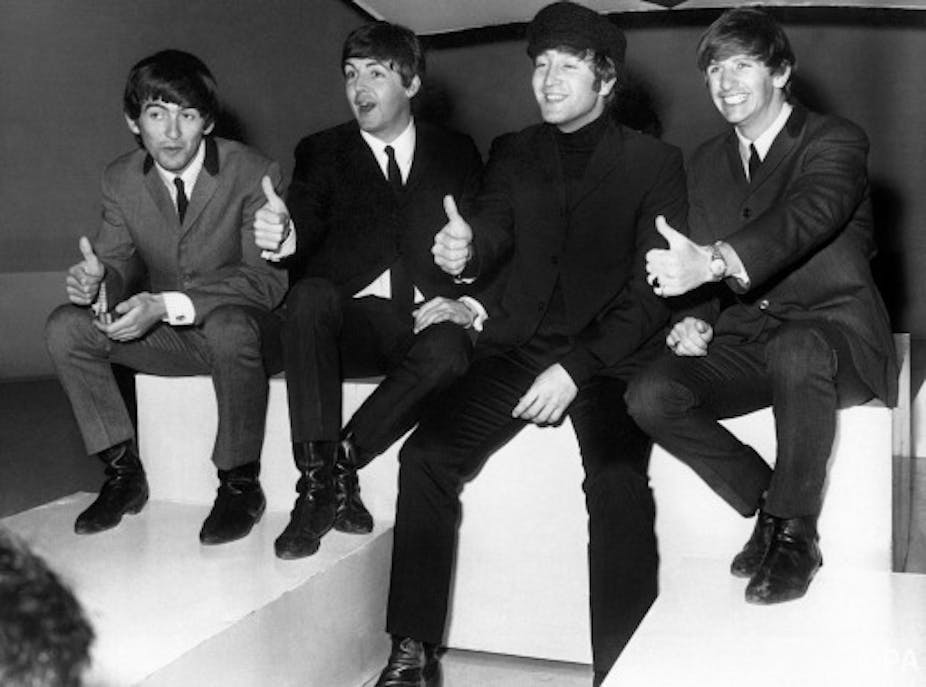July 6 2014 marked the 50th anniversary of the Royal Charity Premiere of A Hard Day’s Night, the Beatles’ first feature film. With its mock-documentary format, it captures a day in the life of the Beatles at the height of Beatlemania (the film’s working title), and the true beginning of modern celebrity – a kind of fame that went far beyond what had gone before, and certainly beyond the Beatles’ music itself.
The Beatles are the ultimate symbol of the 1960s, and were already part of the cultural zeitgeist in 1964, magnifying and reflecting that which they embraced. To this day their music provides a soundtrack to a version of the 1960s, real or imagined, where we seem happy to return again and again.
Film theorists and cultural historians have long revered A Hard Day’s Night as a key 1960s text; on its release, it was famously described in the Village Voice as “the Citizen Kane of jukebox musicals”. But for the 12,000 fans who screamed outside the premiere and those who subsequently paid to see it at their local cinema, it simply offered the chance to see and hear their heroes up close.
So why were and are the Beatles so famous – and why, 50 years on, do we still care? The answer, I would argue, lies in the period in which Beatlemania took root.
Right place, right time
Beatlemania was a unique convergence of the media, fans, and a cultural phenomenon in the right place at the right time. 1964 saw the publication of Marshall McLuhan’s “Understanding Media”, which (among other things) introduced us to the concept of the “global village”. Changes such as the rising ownership of TVs in British homes and the resurgence of the British film industry both played a key part in the Beatles’ international success – and allowed the Beatles, in turn, to become global standard-bearers for the UK.
They were, according to music journalist Ian MacDonald, the perfect “McLuhanites”, made for the new visual media. They were a gang, full of youthful exuberance and wit, Northerners, and talented. They perfectly embodied the emerging theme of upward social mobility and the idea of a new classless society, and were the epitome of the new meritocracy.
They were men of ideas, breaking down the popular/intellectual divide through their engagement with other art forms; that only increased as the decade progressed; books, films, TV shows and the avant-garde and satire movements would all form part of their starnet as the decade progressed.
Yet, paradoxically, while the Beatles did dramatically subvert the traditional expectations of pop stars, another major part of their success was much more conventional: the foursome’s close relationship and commitment to their fan club, which played a big part in fostering the adoration and fan–worship of the Beatlemania period.
Cut your hair!
Another often overlooked factor was the version of masculinity the Beatles representated, which was explicitly resistant to the norm. A certain gender fluidity was part of their appeal to both sexes. To the fans, they offered four different aspects of masculinity: pick your favourite – the acerbic John, baby-faced, pouting Paul, quiet and spiritual George, or Ringo, the ordinary one.
Their most obvious challenge to the traditional masculine image was the mop-top hairstyle, a feminised style which owed much to the US 1960s girl groups, and a song-writing style which often spoke to the perspective of the female fan. “She Loves You”, perhaps the core of the Beatlemania period, takes the form of a conversation between two men about relationships. The refrain “You should be glad” predated the concept of the new man by 20 years. All of this is at its feverish height in “A Hard Day’s Night”.
In the Twilight Zone episode Walking Distance, Gig Young stars as businessman Martin Sloane who, worn down by modern living, finds himself back in the town of his childhood where nothing has changed. Maybe that’s what keeps drawing us back to Beatlemania: a nostalgia for simpler times – real or imagined.
And yet, the cultural phenomenon of the Beatles has changed and adapted to fit right into the 21st century. In McLuhan’s global village made real, iTunes, Youtube, Amazon and ebay all provide platforms for 21st-century Beatlemania to flourish, 50 years on. Still the perfect McLuhanites.
As the band’s longtime press officer Derek Taylor put it when announcing their breakup in 1970: “The Beatles are not a pop group; they are an abstraction, a repository for many things.”

